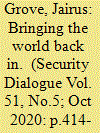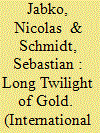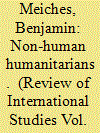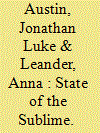|
|
|
Sort Order |
|
|
|
Items / Page
|
|
|
|
|
|
|
| Srl | Item |
| 1 |
ID:
175128


|
|
|
|
|
| Summary/Abstract |
Quantum physics is being positioned as a new archive for addressing major theoretical problems in the field of international relations. Two of the major proponents of engaging quantum thinking within international relations, James Der Derian and Alexander Wendt, have argued that quantum thinking offers the possibility of a major paradigm shift in the field. Before we determine quantum’s revolutionary potential, the persistent and most pressing question for me is how to position quantum thinking among other kinds of and claims to knowledge. I want to horizontalize where different kinds of knowledge sit within the renewed attention to quantum theory. Rather than just horizontalize or flatten ontology, I want to see what happens when we place scientific and philosophical inquiry in dialogue, and what that conversation does to the authority and value of quantum thinking for the social sciences. The article reconstructs the dialogue between the first generation of quantum physicists and the philosophers who informed them. Rather than make an explicit argument about the philosophical debt of physics, I argue that a broad and highly interdisciplinary set of questions drove both fields well beyond the specific areas of expertise of any of these thinkers. I believe this adventure of ideas followed by physicists, philosophers, and social theorists alike offers us a way forward as the complexity of our contemporary global challenges confront us now with the necessity to think well beyond our disciplinary expertise.
|
|
|
|
|
|
|
|
|
|
|
|
|
|
|
|
| 2 |
ID:
152529


|
|
|
|
|
| Summary/Abstract |
This article is a discussion of the “discourse on the unthinkable” surrounding potential future democratic engagements with rivers as non-human persons or natural objects. In the context of the Asia–Pacific region, this article suggests that the developments in material philosophy entitled “new materialism” are essential tools in the reconceptualisation of rivers as democratic entities but that local socio-historical conditions must also be taken into the account. In order to make its case, the article not only surveys the context for considering rivers as non-human persons in a juridical context but also discusses the new material context that assists modern democracies in the renegotiation of the demos that forms the body politic of democracy – often in the face of neoliberal exploitation and a legacy of extremes in instrumentalism. The article argues that the incorporation of water in the democratic project of enfranchisement is an essential exercise born of many Western beliefs and ideals but articulated uniquely at a regional and national level.
|
|
|
|
|
|
|
|
|
|
|
|
|
|
|
|
| 3 |
ID:
186594


|
|
|
|
|
| Summary/Abstract |
Why has gold persisted as a significant reserve asset despite momentous changes in international monetary relations since the collapse of the classical gold standard? IPE theories have little to say about this question. Conventional accounts of international monetary relations depict a succession of discrete monetary regimes characterized by specific power structures or dominant ideas. To explain the continuous importance of gold, we draw on insights from social psychology and new materialist theories. We argue that international monetary relations should be understood as a complex assemblage of material artifacts, institutions, ideas, and practices. For much of its history, this assemblage revolved around the pivotal practice of referencing money to gold. The centrality of gold as experienced by policymakers had important effects. Using archival and other evidence, we document these effects from the 1944 Bretton Woods conference through the transition to floating exchange rates in the mid-1970s; most IPE scholars underestimate the role of gold during this period. Power relations and economic ideas were obviously important, but they contributed little to a fundamental development: the long process of reluctantly coming to terms with the limitations of specie-backed currency, and the progressive and still ongoing decentering of gold in international monetary relations.
|
|
|
|
|
|
|
|
|
|
|
|
|
|
|
|
| 4 |
ID:
164433


|
|
|
|
|
| Summary/Abstract |
The study of humanitarian intervention typically focuses on the human victims and saviours in armed conflict and natural disasters. Moreover, explanations of the virtues of humanitarian norms and ethics emphasise the importance of the university of suffering and the empathic nature of humanitarian efforts. In contrast, this article explores the neglected world of ‘non-human humanitarians’. Specifically, the article outlines three cases of non-human actors that expand and complicate international humanitarian practices: dogs, drones, and diagrams. Drawing on new materialist and posthuman literatures, the article argues that non-humans possess distinct capacities that vastly expand and transform humanitarian efforts in ranging from relief, to medicine, to conflict resolution. Highlighting non-human humanitarians thus offers a new perspective on the resources available for redressing mass violence and conflict, but also complicates existing definitions of humanitarian norms. To the contrary, the article demonstrates that non-humans often maximise humanitarian services to a degree greater than their human counterparts, but have also introduced changes into humanitarian practices that have problematic unintended consequences. Non-human humanitarians reveals previously discounted participants in international politics and the key roles they play in various international interventions.
|
|
|
|
|
|
|
|
|
|
|
|
|
|
|
|
| 5 |
ID:
141463


|
|
|
|
|
| Summary/Abstract |
Critical scholarship on the camp tends to focus on the institution’s historical role in producing forms of social exclusion often by linking the emergence of the camp to the creation of abstract political divisions such as citizenship and nationality. While this approach has unquestionable value, it overemphasizes the importance of social constructions in the history and development of the camp. This article calls for a re-examination of the material elements composing camp spaces by offering attention to how non-human entities and processes contribute to the development of practices of confinement, security and governance. Drawing on the work of Manuel DeLanda, Gilles Deleuze, and Félix Guattari, this article develops an outline of the camp as a material assemblage and examines how the camp emerges from the interaction of barbed wire, war, and the rise of motorized transport. This process of historical emergence helps to explain the elastic and transient dimensions of the camp as constitutive of a new form of fluid political control. Moreover, the article claims that attending to the materiality of the camp helps to explain the expanding role that camps will play in the future of political governance.
|
|
|
|
|
|
|
|
|
|
|
|
|
|
|
|
| 6 |
ID:
141782


|
|
|
|
|
| Summary/Abstract |
Critical scholarship on the camp tends to focus on the institution’s historical role in producing forms of social exclusion often by linking the emergence of the camp to the creation of abstract political divisions such as citizenship and nationality. While this approach has unquestionable value, it overemphasizes the importance of social constructions in the history and development of the camp. This article calls for a re-examination of the material elements composing camp spaces by offering attention to how non-human entities and processes contribute to the development of practices of confinement, security and governance. Drawing on the work of Manuel DeLanda, Gilles Deleuze, and Félix Guattari, this article develops an outline of the camp as a material assemblage and examines how the camp emerges from the interaction of barbed wire, war, and the rise of motorized transport. This process of historical emergence helps to explain the elastic and transient dimensions of the camp as constitutive of a new form of fluid political control. Moreover, the article claims that attending to the materiality of the camp helps to explain the expanding role that camps will play in the future of political governance.
|
|
|
|
|
|
|
|
|
|
|
|
|
|
|
|
| 7 |
ID:
188992


|
|
|
|
|
| Summary/Abstract |
Security politics is everywhere, its tendrils entangled with every aspect of life. Nonetheless, this hyper-securitised status quo has not interrupted the flow of everyday life, nor the circulation of people, goods, or ideas. For the privileged of the world, a paradox has emerged: war, terrorism, ecological disaster, pandemics, and many other ‘monstrous’ forms of insecurity are now experienced as mundane and manageable phenomena in spite of the exceptional political measures, and more generalised affective states of fear and anxiety, that they have proliferated. How has this occurred? This article argues that aesthetic processes and politics are fundamental to the maintenance of this paradox. To do so, we draw on Bruno Latour’s concept of ‘transfrayeurs’ (trans-fears) to understand how modes of aesthetic design are deployed to simultaneously locate sublime imaginaries of insecurity in our midst while also allowing us to live with, accept, and forget their presence. More specifically, we suggest that trans-fearing is achieved through ‘aesthetic protocols’ that specify principles for designing material, affective, and discursive forms into our lives in ways that allow for the careful ‘calibration’ of how we (unequally) experience a hierarchised, depoliticised, and militarised ‘state of the sublime’ within global security politics.
|
|
|
|
|
|
|
|
|
|
|
|
|
|
|
|
| 8 |
ID:
123585


|
|
|
|
|
| Publication |
2013.
|
| Summary/Abstract |
In the 'human' world we believed that we could transform necessity into freedom through our own creativity and agency, understanding the laws of the external world and mastering them through the development of culture, science and technology. In the 'post-human' world, we are told by new materialists, actor-network theorists and post-humanists that creativity and agency still exist, but that they are not the property of humans alone; rather, they are a product of the assemblages, associations and relationships through which we are attached to the world. Rather than attempting to understand and act in the world on the basis of our separation from it - articulated in the constraining, alienating and resentment-filled modernist divides of human/nature, subject/object, culture/environment - we should develop our understandings of 'attachment' to the world. This article critically examines these claims and suggests that, on the contrary, we become less 'attached' and that the external word becomes increasingly alien and mysterious to us. In doing so, it mounts a defence of subject/object understandings and social constructions of freedom and necessity.
|
|
|
|
|
|
|
|
|
|
|
|
|
|
|
|
|
|
|
|
|